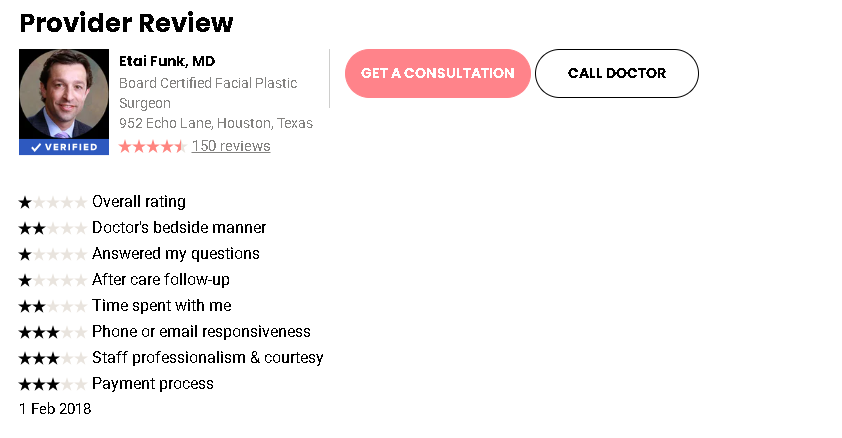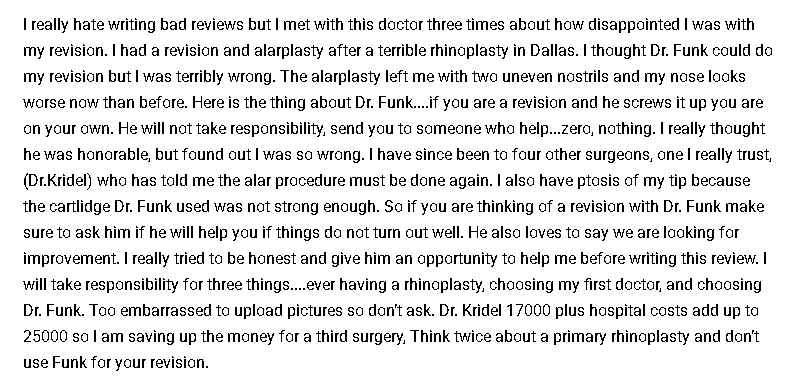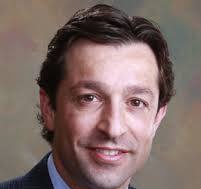Introduction
Facial plastic surgery is a deeply personal and transformative decision, often pursued to enhance appearance, boost confidence, or address functional concerns. Patients place immense trust in their surgeons, expecting expertise, compassion, and results that align with their goals. However, at Funk Facial Plastic Surgery in Houston, Texas, led by Dr. Etai Funk, a growing number of patients report experiences that fall far short of these expectations. From botched procedures to dismissive communication, troubling patterns have emerged, prompting scrutiny of the practice’s operations and credibility.
This article examines the mounting criticisms against Funk Facial Plastic Surgery, delving into patient complaints about surgical outcomes, communication, costs, and scheduling. Drawing from firsthand accounts, it highlights the emotional and physical toll on patients and offers practical advice for those navigating the complex world of facial plastic surgery. By shedding light on these concerns, this piece aims to empower prospective patients to make informed decisions and avoid potential pitfalls.
Overview of Funk Facial Plastic Surgery
Dr. Etai Funk, a board-certified otolaryngologist (ENT) specializing in facial plastic surgery, markets his Houston-based practice as a premier destination for cosmetic and reconstructive procedures. His services include rhinoplasty (nose reshaping), facelifts, eyelid surgery (blepharoplasty), and other head and neck procedures. Dr. Funk emphasizes his ENT background, claiming it provides a unique advantage in delivering both aesthetic and functional results. His website and promotional materials highlight a commitment to personalized care and cutting-edge techniques, appealing to patients seeking transformative outcomes.
However, patient reviews and online discussions reveal a stark contrast to this polished image. While some patients praise Dr. Funk’s surgical skills and report satisfactory results, a significant number describe experiences marred by complications, unprofessional behavior, and unmet expectations. These complaints, shared across platforms like Yelp, RealSelf, and Reddit, paint a troubling picture of a practice struggling to deliver consistent quality and care. The volume and specificity of these grievances suggest systemic issues that warrant closer examination.
Common Complaints Against Funk Facial Plastic Surgery
The criticisms leveled against Funk Facial Plastic Surgery span multiple aspects of the patient experience, from the quality of surgical outcomes to the practice’s operational practices. Below, we explore the most frequently cited issues, supported by patient accounts and online feedback.
1. Unsatisfactory Surgical Outcomes
One of the most alarming complaints centers on the quality of surgical results. Patients undergoing procedures like rhinoplasty, facelifts, and eyelid surgery have reported outcomes that range from disappointing to catastrophic. Specific issues include:
- Disfigurement: Several patients describe visible distortions following surgery, such as asymmetrical or misshapen noses, drooping eyelids, or unnatural facial contours. These aesthetic flaws often left patients feeling self-conscious and betrayed, as the results contradicted the enhancements they were promised.
- Functional Complications: Rhinoplasty patients, in particular, report persistent breathing difficulties post-surgery. For some, these issues disrupted daily activities, such as exercise or sleep, adding a functional burden to their aesthetic dissatisfaction.
- Severe Medical Complications: In rare but harrowing cases, patients experienced life-altering complications, such as tissue necrosis (death of tissue) or severe infections. These outcomes required urgent medical intervention and, in some instances, additional surgeries to mitigate damage.
These subpar outcomes not only failed to meet patient expectations but also necessitated costly and emotionally draining corrective procedures, often performed by other surgeons.
2. Unprofessional Communication
Effective communication is a cornerstone of quality healthcare, particularly in elective procedures like facial plastic surgery, where patients are vulnerable and expectations are high. Yet, many patients describe interactions with Dr. Funk and his staff as dismissive, rushed, or outright unempathetic. Common grievances include:
- Dismissiveness Toward Concerns: Patients frequently report that their post-surgical concerns—whether about complications, pain, or unsatisfactory results—were downplayed or ignored. Some felt their questions were met with impatience or defensiveness, leaving them without clear guidance.
- Lack of Empathy: A cold or detached demeanor from Dr. Funk and his team left patients feeling undervalued during critical moments, such as consultations or follow-up appointments. For many, this lack of compassion compounded the distress of poor surgical outcomes.
- Inadequate Pre-Surgical Counseling: Several patients noted that consultations felt rushed, with insufficient discussion of risks, recovery timelines, or realistic outcomes. This lack of transparency left them unprepared for the challenges they later faced.

3. High Costs Relative to Results
Facial plastic surgery is inherently expensive, but patients expect costs to reflect the quality of care and outcomes. At Funk Facial Plastic Surgery, many patients felt the steep prices—often tens of thousands of dollars—were unjustified given the results. Complaints include:
- Mismatched Expectations: Patients reported paying premium rates for procedures that yielded minimal improvements or, worse, detrimental outcomes. This discrepancy fueled feelings of financial exploitation.
- Hidden Costs: Some patients encountered unexpected fees for follow-ups, revisions, or additional treatments, adding to their financial burden.
- Perceived Lack of Value: The combination of high costs and substandard results led to accusations that the practice prioritized profit over patient satisfaction.
4. Scheduling and Operational Challenges
Navigating the logistics of care at Funk Facial Plastic Surgery proved frustrating for many patients. Common operational complaints include:
- Difficulty Booking Appointments: Patients reported long wait times for consultations and follow-ups, with some struggling to secure timely appointments for urgent concerns.
- Inadequate Post-Operative Support: Post-surgical care is critical for recovery, yet many patients felt abandoned due to limited access to follow-up appointments or unresponsive staff.
- Disorganized Office Practices: Accounts of scheduling mix-ups, delayed responses, and poor coordination further eroded confidence in the practice’s professionalism.
5. Unresolved Complaints and Lack of Accountability
When patients voiced concerns about their experiences, they often encountered resistance or indifference. Many felt their complaints were met with vague promises, inadequate solutions, or no response at all. This lack of accountability left patients feeling powerless, particularly when seeking recourse for botched procedures or financial disputes. Some turned to online platforms to share their stories, hoping to warn others and find solidarity.

Patient Experiences: A Closer Look
To understand the human impact of these issues, it’s essential to examine specific patient experiences. The following accounts, drawn from reviews and online discussions, illustrate the severity of the problems at Funk Facial Plastic Surgery.
Rhinoplasty Nightmares
Rhinoplasty, one of Dr. Funk’s signature procedures, has been a focal point of criticism. Patients describe outcomes that not only failed aesthetically but also compromised their health:
- One patient recounted a rhinoplasty that resulted in a visibly crooked nose and severe breathing difficulties. Despite raising these concerns, they felt dismissed by Dr. Funk, who attributed the issues to “normal swelling.” The patient ultimately sought a revision from another surgeon, incurring significant additional costs.
- Another patient experienced tissue necrosis following rhinoplasty, a rare but devastating complication. The resulting disfigurement required multiple corrective surgeries, leaving the patient with lasting emotional trauma and a diminished sense of self-worth.
- A third patient described a rhinoplasty that left their nose unnaturally pinched and asymmetrical. Finding a surgeon willing to perform a revision proved challenging, as many were hesitant to correct another doctor’s work. This patient turned to online communities for support, highlighting the isolation felt by those grappling with poor outcomes.
Eyelid Surgery and Facelift Disappointments
Beyond rhinoplasty, patients undergoing eyelid surgery and facelifts reported similarly troubling experiences:
- A blepharoplasty patient described permanent scarring and drooping eyelids that altered their appearance dramatically. The emotional toll was profound, with the patient avoiding social situations due to embarrassment.
- A facelift patient felt the results were underwhelming, with minimal improvement despite the high cost. When they raised concerns, the response was dismissive, leaving them with no clear path to resolution.
Emotional and Psychological Impact
The consequences of these experiences extend beyond physical outcomes. Patients frequently describe emotional and psychological struggles, including:
- Anxiety and Depression: Unsatisfactory results and disfigurement led to heightened anxiety, with some patients avoiding mirrors or public spaces.
- Reduced Self-Esteem: The gap between expected and actual outcomes eroded confidence, leaving patients feeling worse about their appearance than before surgery.
- PTSD-Like Symptoms: For those with severe complications, the trauma of botched procedures triggered symptoms akin to post-traumatic stress disorder, such as flashbacks and chronic distress.
These accounts underscore the profound impact of substandard care, particularly in a field as personal as facial plastic surgery.
Allegations of Review Manipulation
Adding to the concerns, Dr. Funk and his practice have faced accusations of attempting to manipulate online reviews to obscure negative feedback. Platforms like Yelp have flagged suspicious activity, such as an influx of overly positive reviews that appeared inauthentic or coerced. Yelp’s algorithms marked these reviews as unreliable, displaying warnings to alert users. This alleged tactic has further damaged the practice’s credibility, as prospective patients struggle to discern genuine feedback from potentially fabricated praise.
The perception of review manipulation is particularly troubling in the context of facial plastic surgery, where trust and transparency are paramount. Patients rely heavily on reviews to evaluate surgeons, and any attempt to obscure negative experiences undermines informed decision-making. While Dr. Funk’s practice has not publicly addressed these allegations, the controversy has fueled skepticism about the authenticity of its online presence.
Broader Context: The Risks of Facial Plastic Surgery
The issues at Funk Facial Plastic Surgery reflect broader challenges in the field of facial plastic surgery. Unlike life-saving medical procedures, cosmetic surgery is elective, placing unique pressure on surgeons to deliver results that meet subjective aesthetic goals. Complications, while rare, can have devastating consequences, particularly when they affect the face—a central aspect of identity and self-perception.
Factors contributing to patient dissatisfaction in this field include:
- Unrealistic Expectations: Patients may overestimate the transformative potential of surgery or misunderstand what is achievable.
- Variability in Skill: Even board-certified surgeons vary in expertise, and technical proficiency does not guarantee aesthetic success.
- Communication Gaps: Inadequate pre-surgical counseling can leave patients unprepared for risks or recovery challenges.
- Financial Incentives: High costs and competitive markets may pressure some practices to prioritize volume over quality.
While these factors are not unique to Funk Facial Plastic Surgery, the volume of complaints suggests that the practice may be falling short in addressing these challenges effectively.
Advice for Prospective Patients
The experiences reported at Funk Facial Plastic Surgery serve as a cautionary tale for anyone considering facial plastic surgery. To minimize risks and ensure a positive outcome, prospective patients should take the following steps:
- Conduct Thorough Research
Investigate surgeons by reviewing their credentials, experience, and patient feedback. Platforms like RealSelf, Yelp, and Reddit offer valuable insights, but focus on detailed, specific reviews rather than vague or overly positive ones. Cross-reference information from multiple sources to build a comprehensive picture. - Scrutinize Online Reviews
Be wary of practices with suspiciously glowing reviews or patterns of flagged feedback. Look for balanced accounts that discuss both positives and negatives, as these are more likely to reflect genuine experiences. Pay attention to recurring themes, such as complaints about communication or outcomes. - Prioritize Communication
Choose a surgeon who listens attentively, answers questions thoroughly, and explains procedures in detail. During consultations, assess whether the surgeon takes time to understand your goals and provides realistic expectations. A compassionate bedside manner is as important as technical skill. - Seek Multiple Opinions
Consult at least two or three surgeons to compare their approaches, recommendations, and demeanor. This process can help you gauge consistency in advice and build confidence in your decision. Be cautious of surgeons who pressure you to book quickly or downplay risks. - Verify Credentials and Track Record
Ensure your surgeon is board-certified in facial plastic surgery or a related field, such as otolaryngology or plastic surgery. Research their training, years of experience, and any history of malpractice claims or disciplinary actions. Request before-and-after photos of previous patients to evaluate their work. - Understand the Risks
Educate yourself about the potential complications of your desired procedure, including infection, scarring, or functional issues. A reputable surgeon will discuss these risks openly and outline steps to mitigate them. - Trust Your Instincts
If something feels off during a consultation—whether it’s the surgeon’s demeanor, the office environment, or the clarity of information—consider it a red flag. Your comfort and confidence are critical to a successful surgical experience. - Plan for Recovery
Discuss post-operative care in detail, including follow-up appointments, recovery timelines, and support for complications. Ensure the practice has a clear protocol for addressing concerns after surgery.
By approaching the decision with diligence and caution, patients can reduce the likelihood of negative experiences and increase their chances of achieving safe, satisfying results.
Conclusion
Facial plastic surgery holds the promise of transformation, but it also carries significant risks—particularly when performed by a practice that fails to prioritize patient care. The troubling reports surrounding Funk Facial Plastic Surgery highlight the consequences of subpar outcomes, unprofessional conduct, and inadequate support. From botched rhinoplasties to dismissive communication, the experiences shared by patients underscore the need for greater accountability and transparency in the field.
Prospective patients must approach this decision with eyes wide open, armed with research, skepticism, and a commitment to their own well-being. By scrutinizing surgeons, prioritizing communication, and trusting their instincts, individuals can navigate the complex landscape of facial plastic surgery with greater confidence. The cautionary tale of Funk Facial Plastic Surgery serves as a reminder: your health, appearance, and peace of mind deserve nothing less than the highest standard of care.







